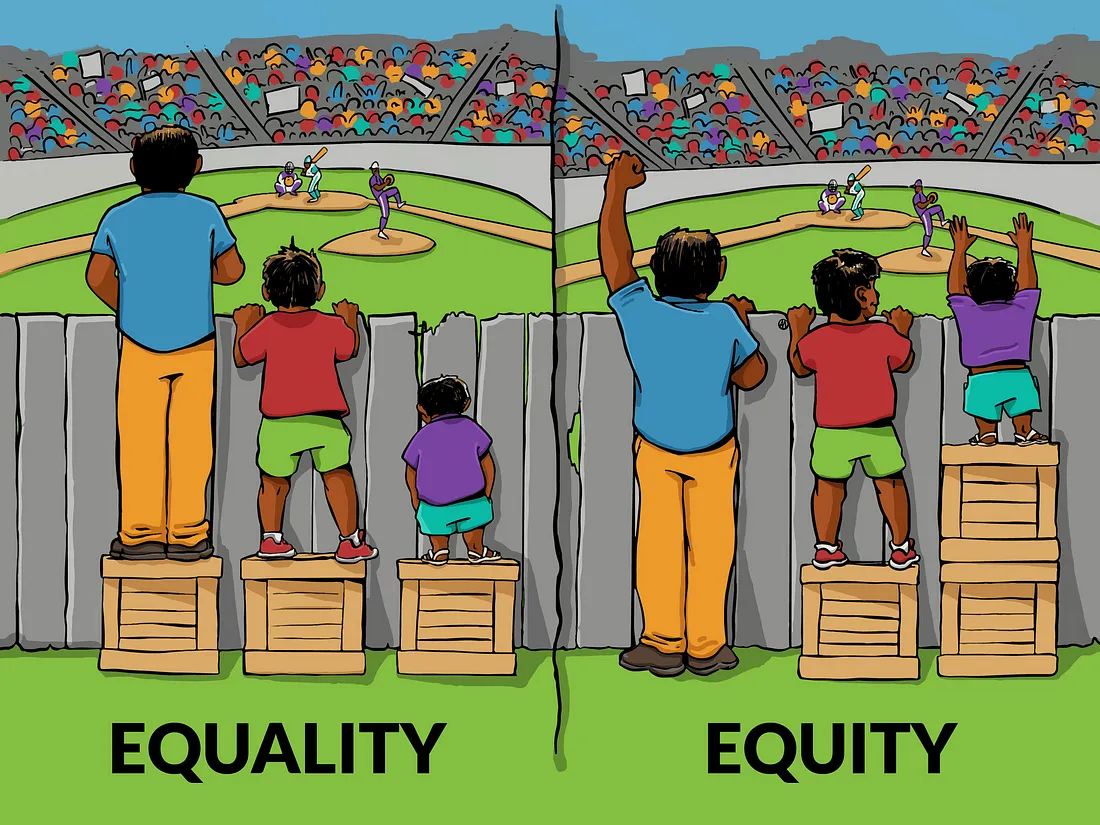
“All the believers were one in heart and mind. No one claimed that any of their possessions was their own, but they shared everything they had. With great power the apostles continued to testify to the resurrection of the Lord Jesus. And God’s grace was so powerfully at work in them all that there were no needy persons among them. For from time to time those who owned land or houses sold them, brought the money from the sales and put it at the apostles’ feet, and it was distributed to anyone who had need.” Acts 4:32-35
In Matthew 20:1-16, Jesus tells a story about a landowner who hires workers at different times of the day but pays them all the same wage. When those who worked the longest complain, the landowner responds by saying he is being fair because he gave each worker what was agreed upon, demonstrating that God’s justice is not about equal outcomes, but about what is right according to His will.
In modern society, the terms fairness, equality, and equity are often used interchangeably to mean that everyone should receive the same treatment or the same outcomes, regardless of their individual circumstances, roles, or needs. This is a concept that could be ungodly when it disregards God’s sovereignty over His creation and the individual purposes He has for each person. Today, there’s a strong emphasis on equality—equality of gender, rights for children, and equal roles in the church and society. Many people believe that everyone should be treated equally and have the same opportunities, roles, and privileges. This belief is rooted in a desire for fairness, where everyone receives equal recognition and opportunities, regardless of their circumstances or individual roles.
God’s justice is about giving each person what is right according to God’s standards. It doesn’t mean that everyone gets the same in terms of rewards, responsibilities, or roles.
God’s impartiality (Romans 2:11) stems from His just and righteous nature, reflecting both fairness and the intrinsic worth of all people. Recognises the inherent dignity of every person (Genesis 1:27).
Biblical fairness is quite different from what the world may view as equality. The scripture teaches us that while every person has equal worth in God’s eyes, the roles, functions, and purposes assigned to each person may not be the same.
In society, when we talk about equality, we often mean that everyone should have the same rights, treatment, and outcome, regardless of differences like gender, age, or abilities. Equity, on the other hand, means addressing the specific needs and circumstances of each person in order to bring about fairness. For example, it is not about giving everyone the same treatment, but about providing what is needed for each person to thrive according to their unique role and purpose. In the scripture, we see that biblical fairness is more aligned with equity than equality. This doesn’t mean that people are treated unequally in terms of their worth or dignity. Rather, it means that God’s justice is about giving each person what is right based on their individual circumstances and God’s sovereign will.
For example, in the early church in Acts, believers shared their possessions, but they did so based on needs, not equality. Acts 2:44-45 says, “And all who believed were together and had all things in common. And they were selling their possessions and belongings and distributing the proceeds to all, as any had need.” The believers did not give the same amount to everyone; they gave according to what each person needed, ensuring no one was left in want. This is a perfect example of equity—responding justly to individual needs, rather than providing an equal amount to all. The same principle is seen in Acts 4:32-35, where the believers distributed goods based on need, not an equal share for everyone.
People often think that fairness and equality mean giving everyone the same thing—whether it’s in society, the church, or in the workplace. However, when the scripture speaks of fairness, it doesn’t always mean equal treatment. Take, for instance, gender roles. In many parts of the world, people argue for the equality of men and women in all roles, including leadership in the church. While both men and women are equal in worth and dignity before God, the scripture teaches that they have distinct roles and functions in God’s plan. This is not a matter of inequality in worth or honour, but of God’s sovereign design for the roles He has assigned to each gender.
Similarly, the scripture provides guidance on how we should view children. In modern society, there is a call for equal rights for children, but the scripture places an emphasis on responsibility, nurturing, and discipline for children rather than equality with adults. In Ephesians 6:1-3, children are called to honour their parents: “Children, obey your parents in the Lord, for this is right. ‘Honour your father and mother’—this is the first commandment with a promise—that it may go well with you and that you may live long in the land.” (ESV) While children have worth and dignity, their role is to honour and submit to their parents. This is not an inequality, but rather a role that aligns with the purpose God has for the family structure.
God’s grace and mercy play significant roles in His fairness. While the world often emphasizes equality, God’s fairness is shown through His grace—giving us what we do not deserve—and His mercy—withholding from us what we do deserve. For example, the Parable of the Workers in the Vineyard (Matthew 20:1-16) illustrates how God gives what is right according to His sovereign will, not according to the expectations of the workers. The workers who laboured the longest expected to receive more, but the landowner gave all of them the same wage, teaching us that God’s generosity does not conform to our human expectations of fairness.
